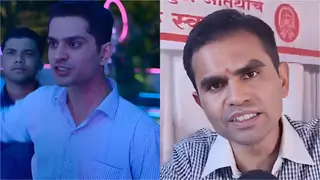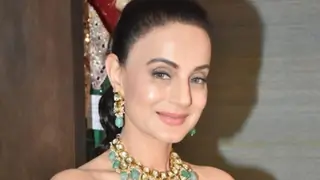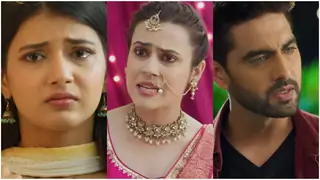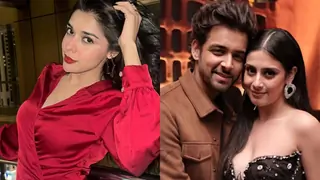 Jagjit Singh prefers live concerts to studio recordings. — Photo by Vinay Malik |
Age has failed to wither his music. Like many years ago, Jagjit Singh, the master composer, still understands the soul of a musical heart to perfection. He still touches chords deep inside that one never knew existed. And just when you thought destiny had written him off, back he comes knocking at the reservoirs of locked emotion, letting them surface.
Suddenly his music grabs the soul and sets the spirit free. Like old times when it would knot sweet pain and ecstatic love in strange weaves, his melody returns to tug at every lover's heart. And it does so with a sweet, unexplainable urgency, typical of this man's manner. It unleashes a world of acceptance, which shone intensely in his all-time classic Yeh kagaz ki kashti
Each of Jagjit's offerings is so perfect that years after it was rendered, nothing quite equals its charm. Be it through the controlled restraint of Baat niklegi to phir or the subtle spoof of Duniya jise kehte hain, Jagjit, by the sheer virtue of his talent, continues to take the world on a roller-coaster ride of emotions, where it touches the zenith of ecstasy and the depths of despair. And as it see-saws in confusion, it doesn't quite know what it enjoyed more.
It's this strange now pain-now pleasure state of Jagjit's music, which still endears him to everyone, compelling them to soak in his melodies. The exclusivity of his music lies not so much in its success as in its ability to enter a listener's heart and stay there eternally.
For, through his music, Jagjit talks not just to people, but also their heart. And whatever disguise it may be buried under, every heart beats with the same poignancy, it bleeds over betrayal and sings in love; it cries over loss and rejoices in reunion.
Jagjit's music captures the pulse of beating hearts. Credit it to the maestro's composing skills or his conjurer-like control over lyrics and rhythms; he stands apart from his contemporaries, who never could achieve what he did.
And no matter how caustic his criticisms might have been, he always managed to tide over them, to consume them rather than be consumed. That's why he continues to be relevant even in times when some believe his musical innings is over.
In Chandigarh recently to visit Durga Das Foundation's school in Sector 26, the musician walked us down memory lane, spilling along the way details of his tumultuous life '85.an obscure childhood, a zealous youth, an arduous journey, a sweet home and a tragedy that set the tone for Jagjit's musical revival – a process that continues.
Birth of a legend
Jagjit is not too comfortable discussing his past, especially his childhood, which was drowned in obscurity. Born to humble parents, who wanted him to be in administrative services, Jagjit was quite unconsciously drawn to music.
As a child, he would devour Talat Mehmood's songs; as a youngster he loved Ustad Amir Khan's style. Soon, his fascination for music started paying off when as a youngster, he earned laurels for his Jalandhar college. The taste of success was sweet and Jagjit never let go of that tinge.
He admits: "I was destined to sing. I could perhaps not have done anything else. But it was the audience appreciation that kept me going. It gave me the courage to go to Bombay in 1961 and find a new life in a world that was unwelcoming."
Jagjit started off by singing at private parties of film personalities, courtesy Om Prakash, who introduced him to the film world. None of the actors, however, gave Jagjit a break. It was in only 1968 that Ajit Merchant gave him his first chance to sing in a Gujarati film.
New idiom sans films
Having tried his luck in films and failed, Jagjit moved on to master his talent for ghazal – a genre that had the power to connect to people. His deep, intense, voice helped him immensely. "It's a wonderful medium that enables communication, evokes people's emotion and angst at the same time. For me personally, a ghazal must be quintessentially philosophical at heart. That's why in my albums, lyrics are virtually gold. Technique is subordinate to poetry," says Jagjit, whose life in Bombay was all about struggle.
"I became a victim of jealousies. Few singers dominated the industry and I never got a chance. So I had to find myself one. I dedicated myself to ghazals. Soon HMV released my first EP (extended play) which had one more artiste," says Jagjit. The EP sold 5000 copies.
His best critic
For Jagjit, Chitra has been the best critic, a friend who ensures that the best goes out. No wonder he still takes her to his recordings, though she stopped singing many years ago. In terms of singing, he says he doesn't miss Chitra. But she is a must-have when he's on job.
"I always ask her if my pronunciation is correct, if the voice throw is fine. I value her criticism on the technical aspects. But for composition and selection, I trust my instinct. She does she," says Jagjit, who married Chitra in 1970 after her first husband Debo Prasad Dutta divorced her. Just a year after the marriage, their son Vivek was born.
For Chitra, who had a tough first marriage, it was a proverbial coming around of life. "I learnt a lot from Jagjit ji. Singing with him was pure bliss. Even today, I want to return to singing and I have tried hard but I think I allowed my voice to rust for far too long. I can't find it back. I am now busy practicing healing and spirituality," says Chitra, who has shared many a golden moment with Jagjit. It is, however, The Unforgettables which still lights up the couple's faces.
Unforgettable album
Laced with ghazals like Raat bhi neend bhi and Baat nikalegi, The Unforgettables is by far Jagjit and Chitra's best album. It was made at the behest of Anil Sud of HMV who wanted Jagjit to do an LP, Jagjit's first. As always, Jagjit spent maximum time selecting ghazals. In those days, he used modern instruments to add variety to sound.
It was a new sound, different from traditional sounds identified with Ghulam Ali and Mehdi Hassan. People adored the album both for its music and its cover. Chitra's first husband took the picture of Jagjit and Chitra on the album's cover.
Beyond time
There was no stopping Jagjit after the success of The Unforgettables which was followed by Birha da Sultan, a tribute to Shiv Batalvi. The cover of this album had a portrait of Batalvi painted by Amrita Pritam's partner Imroz. After this came Come Alive, an HMV album, which for the first time featured effects of
audience participation.
Along side albums, concerts progressed. In 1979, Jagjit and Chitra went on their first proper tour of England, where they performed live at Wembley. In 1982 they repeated the act at Royal Albert Hall. Both the concerts were converted into albums that became hits. Around the same time came films Saath Saath and Arth, featuring Jagjit's songs. Even today, for HMV this is the highest selling cassette combination ever.
But Jagjit was to create more history, which he did with Beyond Time in 1987. It became the first digitally recorded album by any Indian artiste. No wonder it's still Jagjit's favourite. "We recorded 70 minutes of songs in London. The sound was revolutionary," he prides.
Success apart, the singer prefers live concerts to studio recordings: "On stage I can fly. I feel independent and more in control. And then I get the audience response. Recordings are comfortable as they allow you to repair your voice."
Not that Jagjit didn't have his share of studio work; he did several albums including Mirza Ghalib, which added classicism to his name.
Poetry and Jagjit
Known for his sensible poetry selection, Jagjit created history by presenting Mirza Ghalib in a way that people could easily understand. Made by Gulzar, the teleserial by the same name was a rage as much as its music was.
Jagjit says: "The challenge was to keep the music simple because Ghalib was a poet, not a singer. It was also important to let the poetry speak. The album is my best, aesthetically," says Jagjit, who has, through music, immortalised Nida Fazli, Qateel Shafai, Ahmad Faraz, Kateel Azer, besides upcoming poets.
Tragedy and criticism
Not everything was going to be rosy for Jagjit. On July 28, 1990, his son Vivek died in a car crash in Bombay. Jagjit was devastated. He went silent for six months only to emerge stronger. That was the time when critics thought he was finished but Jagjit had many points to prove, yet. Some of his fine works came after 1990. These included Sajda with Lata Mangeshkar, Someone Somewhere, Hope, Kahkashan (recorded with Ali Sardar Jaffri for a teleserial), Silsilay with Javed Akhtar, Marasim with Gulzar and Samvedna (featuring Atal Behari Vajpayee's poetry).
For Jagjit, Vivek's death was a moment of desperation, which he converted into hope—something that found a reflection in the poetry of his future albums. His urge to fight back notwithstanding, people kept criticising him for stereotypical musical style that relied heavily on instrumentation.
But Jagjit was unfazed. "When I used instruments, I created a new style for myself, a style that could define me as a musician. Customs are meant to be reinvented. As for criticism, I bother little because I know God and people are with me. I still remember the day when I was about to begin a concert in Jammu and my voice choked. I couldn't sing for six months. I prayed to Mata Vaishno Devi to bless me with recovery and I recovered."
Since then, Jagjit and Chitra have been visiting the shrine every year to pay obeisance. Chitra, for her part, is into healing. She imbibed the art from the famous psychic Gordon Higginson of the London Psychic College, where Chitra went after her son's death.
Unclaimed legacy
Having endured his share of tragedy and triumph, Jagjit is desperate to bequeath his legacy. But he has no takers. "I've not yet found an earnest student who can carry my music forward. I feel sad about this and about the fact that the soul of music has been damaged by over-orchestration. Music videos and sound repairing techniques have ensured that music falls from grace. I wish I could change things," says a pensive Jagjit.
The future
"It's difficult to say, but I have a pressing urge to start from the scratch, to return to times when I had the zeal to discover new horizons. Earlier on, when I had just started singing, the realisation of good music dawned much later. Now, it again seems to be eluding me. I must go back 30 years to find myself a fresh start," says Jagjit and departs.
Soon as he goes, an old, familiar melody returns to take his place. It goes: Us mod se shuru karen phir yeh zinadgi, har sheh jahaan haseen thi, hum tum the ajnabi.

























